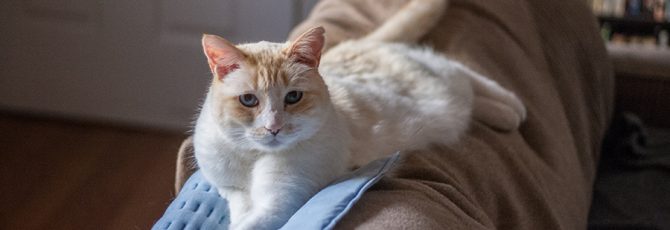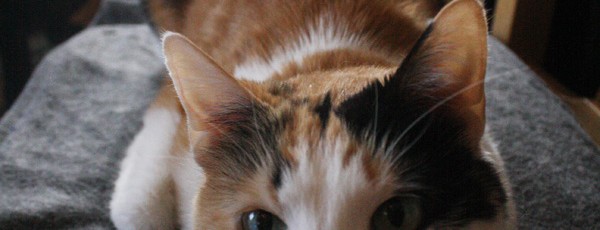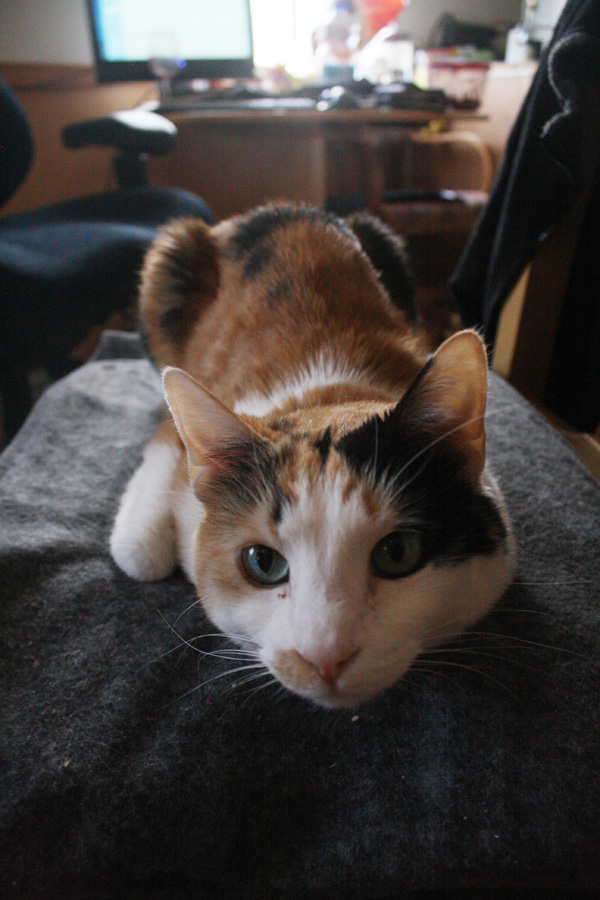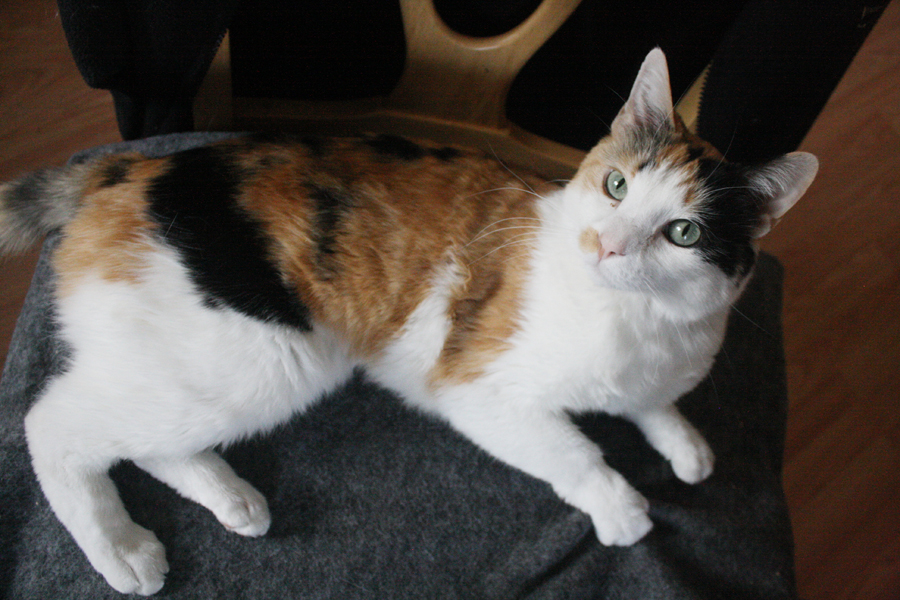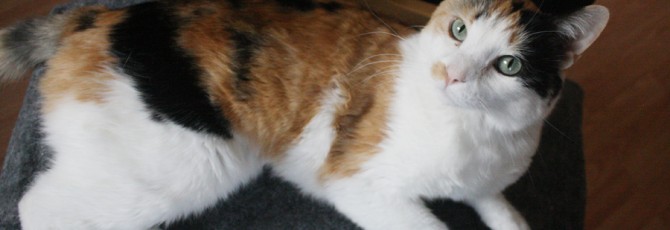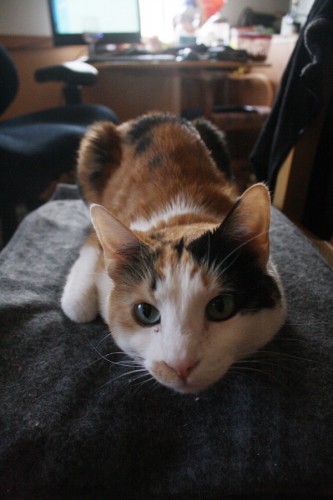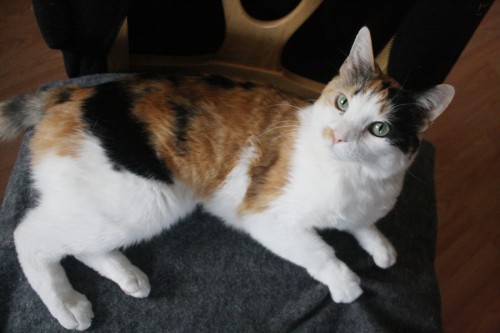The following is the story of the decline and death (euthanasia) of my cat Tweaks, on April 30, 2018. During my grieving process, I found other people’s stories of their own pet’s deaths, declines, and poetry about animal deaths helped me to grieve the loss of my own beloved cat.
It is in that spirit that I have posted my own story. When another of my cats, Apricot, died in 2014, I recounted her death as well. I had previously hidden that post (after feeling ashamed, although I’m not sure why) but, after grieving, and realizing that sharing these stories can help others, I made it public again.
On April 30, 2018, (a Monday), I attempted to load my incredibly weak and sick cat, Tweaks, into his carrier.
Even though he could barely move, he still had enough left in him to parachute his legs to make it as hard as possible for me to get him into the carrier.
On April 28, a Saturday, I took Tweaks to the vet because he had stopped eating the night before. I couldn’t even interest him in tuna.
After some blood work, an x-ray and a physical exam, they decided that he likely had a “mass” on his liver. That’s why he wasn’t eating. (Over the past few years, he had been gradually losing weight and becoming a pickier and pickier eater).
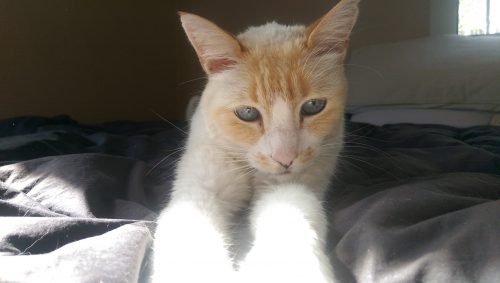
Tweaks on Sunday (pictured here) was very weak and restless.
The prognosis was “poor,” but the vet still gave me some liver medications, a syringe and showed me how to force feed him and how to force him to take pills.
I was hopeful that I could get him to start eating again, that there was no mass.
On Saturday night, I managed to get 20 CCs of water mixed with wet cat food into him, and onto him, and onto my clothes and the floor. It was hard, but I did it. I also managed to give him his pill. That would be the last time.
Sunday (April 29), I tried multiple times to both “pill” him and to force feed him with the syringe. All the attempts went badly but more importantly, I could see he was quickly deteriorating. By the end of Sunday, he could barely jump, he could barely walk and he was incredibly restless. Never have I seen a cat get up and move so much.
He sat on my lap on the couch a few times, for a few minutes, and briefly joined me on his favorite spot: half on the arm of a recliner, half on my leg.
Each time, he couldn’t sit still for more than a few minutes.
I kept a vigil with him. He moved between the inside of the closet to by bed, to the floor, to the doorway, and then back to the inside of the closet.
A few times, he jumped on the bed, moving from his heating pad, to the middle of the bed, to the bottom, and then a few times, coming up to my chest level, briefly lying down before moving again, the same spot, next to me, he used to sleep in when he was well.
At bed time, he finally decided to move to the older chair in the office and he spent the night there.
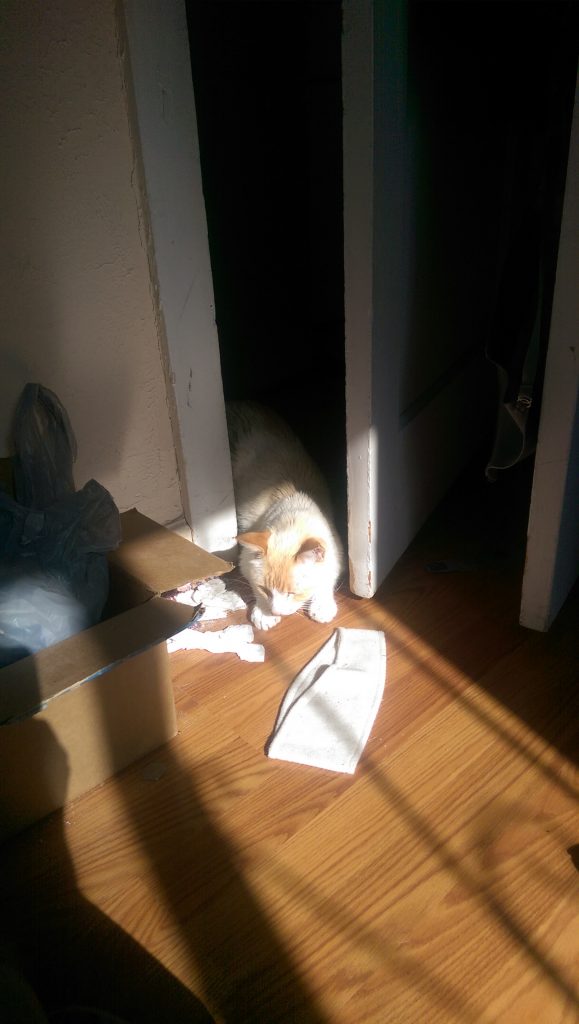
As he declined, Tweaks kept on moving on the floor, on the bed, from sun to shade.
When I woke in the morning (April 30), I could hear a sound here or there in the house, but I wasn’t sure it was him. I woke early, maybe 6 a.m., but I was afraid to check on him. I was afraid he had passed in the night. I was hopeful he had passed during the night so that his suffering would be over. I was scared he had passed in the night because that meant I would not be able to spend his last moments with him.
He was awake, swishing his tail. I picked him up and put him on the bed. He continued to be restless. I gave him one last cuddle on the bed.
In the living room, I laid out a partially folded flannel sheet for him.
After I left the house, I texted my girlfriend, Michelle. (She was at the house when I came back with Tweaks on Saturday, after taking him to the vet. I asked her to go home. I prefer to be alone when I grieve.) I told her, if she wanted to see him one last time, she should head to the house then because the appointment was for 11:15.
When I came home, after finishing a story at work, (Monday was the B-section deadline day) (I left at 10:50. I had previously called the vet and made a 11:15 appointment) he was on the flannel sheets.
As I tried to get him into the carrier, this incredibly weak being managed to parachute out his front and hind legs, managed to make it incredibly hard to get him in. I did. I still buckled his carrier into the front seat. I drove to the vet, the AC on medium, the music barely audible, taking each turn, dip and bump and gingerly as I could.
In the waiting room were two other people waiting to be seen. We waited. And waited. I opened the top of his carrier (it was soft shelled) and was able to rub his head and cheeks. Up until I put him in the carrier one last time, he would still head butt my hand.
The woman next to me had a silent chiuaha and the man had a 15-year-old small dog. They thought the older dog might have had a seizure.
Of course, they asked if my kitty was sick.
This set me off and, through sobs, I said I was here to euthanize him.
They asked what happened, and I explained, as best I could.
The man recounted the few cats he’s had, as well as his daughter’s cat. One cat he took with him everywhere and he was driving to Boise, Idaho, when he let her out of the car at a park so she could pee. (He was driving a convertible). Nearly 200 miles later, he realized he didn’t know where the cat was and he drove back to the park, but couldn’t find her. He put an ad in the local paper, offering a $200 reward. As he was driving around, looking for her, he saw an animal on the side of the road that had been run over.
He didn’t stop, because he couldn’t stop. He couldn’t bear to know she had been killed. He never saw her again.
The man said he cannot bear to get another animal after his 15-year-old (spunky!) dog dies. It’s too much heartbreak.
My dad said the same thing when my first cat, Angel, passed away (from complications of old age). He told me he did not want to have another animal because of the inevitable, or possible, pain losing such a beloved one causes.
I got her when I was in the first or second grade and she lived to 19 or 20, despite problems with cat anorexia and bulimia. (In later life, she had her teeth removed because of the bulimia).
I left her in Carson City with my dad when I went away for college at 18, although she was still bonded to me. She truly became my dad’s cat after I moved to Germany for over a year to be an au pair.
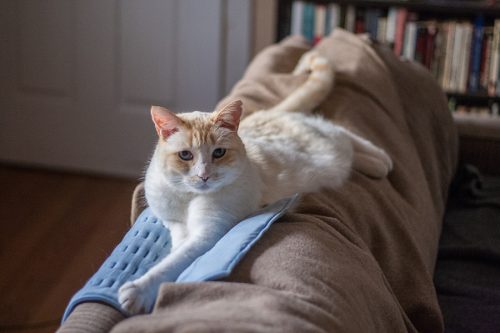
This is tweaks in 2016. His decline was incredibly fast, as it is with many cats.
Finally they took me into a room and the vet gave Tweaks a sedative. With the carrier open, I was able to pet him as he fell asleep (although his eyes remained partially open).
Finally the vet came back, pulled him out of the carrier and into a towel, shaved his leg, dabbed it with alcohol, stuck an IV line in him, hooked up the barbiturate to his IV and plunged it in. (“It’s the same thing the kids are killing themselves with out there,” she said, which wasn’t totally true because barbiturates and opioids are different types/families of drugs and as the cops and courts reporter, who reads all the autopsy reports for Rio Arriba County, I can attest very few people overdose on barbiturates in our area).
“Take as much time as you need,” she said, before wrapping him in the towel.
Somehow, he was placed back in the carrier and, after a few minutes of uncontrollable sobbing, I went to pay. The vet waived the fee (likely because her fellow vet gave me a 30-day supply of liver pills when his life expectancy was closer to seven days, at a cost of $50) and I walked to my car, wailing.
Finally, able to drive home, I started digging his grave. The day before, I had gone to Lowe’s to buy a shovel so I would be prepared. Three-quarters of the way through digging the hole, the brand-new shovel broke, and I went back to the hardware store for a shovel that didn’t have a wood handle.
When I arrived home again, I finished digging the whole, went back inside, grabbed a polarfleece blanket and said my one last goodbye to my lifeless cat. His face was pointed away from me and I remember looking at his eyes one last time. The membrane had already begun to cloud over his beautiful eyes. I wrapped him in the towel, followed by the blanket.
I thought it was ironic that this one last time, I was able to make him into a kitty burrito, when he had so vehemently refused it before.
I carried him to the grave, placed him in, and then got a can of smoked sardines, a can of tuna, and one of the toy rats he so lovingly destroyed with his back paws before he started to lose his desire to play.
After cleaning myself up, I dressed and went back to work.
It wasn’t until the following Wednesday, May 2, that I was able to get closer to finishing his grave. I de-labeled 10 stubby beer bottles, cleaned them, and used them to mark the borders of his grave, to mark the 10 years of his life before I got him.
The plan is to plant some shade-friendly annual flowers on his grave, and mark the outer boundaries with a few more bottles to commemorate the years I got to spend with him and two blue flourishes for his eyes.
Now, each day when I open the front door, I expect him to come running. I walk to the bedroom to charge my phone and I expect him to be on the bed.
Early life
When I first got Tweaks, it was shortly after I lost Apricot. I went to the Santa Fe Animal Shelter which, if you’ve never been, is actually hard to get to, off of the frontage road of 599.
I was walking around the cat room and I saw him, and he was friendly enough. He was 10, a little old, but I figured that older cats need to be adopted too, need to be offered the good life later in life. Santa Fe is overrun with older cats whose owners abandoned them, moved away or, more frequently, died.
I learned from the staff that Tweaks was originally brought to the shelter, 10 years prior, as a stray. He was then neutered, chipped and adopted out.
For whatever reason, that same family (or person) brought him back 10 years later. He was still in the system, just, he was no longer a kitten.
At the shelter, they told me they thought he had arthritis, as evidenced by the way he peed in his litter box there. When I took him to the vet for his initial checkup, they said, don’t worry about it. He was never creaky, although he was cranky after longer naps.
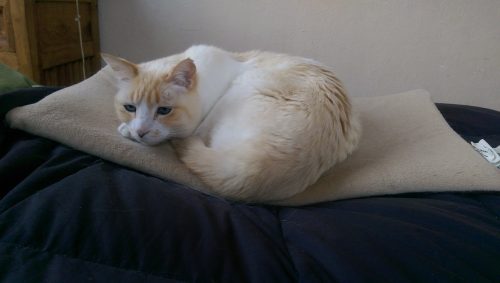
Tweaks loved his heating pad. He was not a fan of being harassed during naps.
One of the first things I bought for tweaks was a bunch of polar fleece blankets. He was never that much of a fan. I also bought him a heating pad because of the arthritis.
If you have an older cat, I highly suggest you get him or her a heating pad.
I would put it away in the summers, when the house would get to hot, but otherwise, it would stay plugged in all the time, on the bed. He loved that thing.
I visited with him in the one-on-one play area and he immediately jumped in my lap. I took him home and initially gave him the run of the house. He quickly hid in the back of the closet of the house I was renting in La Puebla.
With Apricot, I had followed the normal instructions: keep the cat in one room (usually the bathroom) until its acclimated, and then let it explore. Apricot, unlike Tweaks, was incredibly head-strong, brave and rambunctious. She immediately wanted out, and also, she immediately wanted outside.
After a while, Tweaks warmed to the house and either that first night, or maybe a few nights after, he started sleeping on the bed.
I never called Tweaks my “little boy” or “baby” or “child.” I figured that I adopted a full-grown man. At 10, he was 56 in equivalent human years.
I always wondered, and still do, about Tweaks’ early life, and what he was like as a kitten.
Unlike Apricot, Tweaks did not really want to go outside. With Apricot, I tried to let her into the small fenced area in the back of the house but she immediately jumped the fence and went exploring. I would later compromise with her and leave a window open during the day and close it at night. In the early mornings (4-6 a.m.) she would bat me in the face with her paw, demanding to be let out then, after an hour of exploring, come back in.
Tweaks, on the other hand, he liked to sleep in. When I let him into the fenced area, he never tried to jump the fence. He would just sit in the sun and observe.
Later on, when I moved to Espanola, I did not let him outside at all because there was no fence. After a year, I put small fences on either side of the back of my house so he could be outside. He only got out twice. Once, he jumped over the 4-foot-high chicken wire and got into the front yard. The other time, he managed to climb the seven-foot coyote fence at night. I found him on the opposite side, unable to climb back up.
Well, here’s to you Tweaks. I might have only had four years with you, and I was convinced up until your vet appointment that I was going to have another four at least, but the heartbreak, tears, the hurt, was all worth it.
I miss you buddy.
Notes made during the decline
I watched Tweak’s decline and, as it happened, I decided to write down what was happening, to purge a little of the emotion between bouts of bawling. The following is those notes:
Watching Tweaks quickly fade, as he stumbles, refuses to eat, paws at the ground before not drinking water, is incredibly hard.
(Monday morning, he walked over to his water bowl and tried to so viciously paw the ground before a few laps of water, but there was no viciousness there. There was only his failing motor skills, exaggerated motions.)
Pilling him is incredibly hard and it makes me feel like my last moments with him (I am sure that whatever is going on with his liver will be fatal) are going to be bad, bad memories and he will die hating me, even though I am doing what little I can to save his life.
I’m upset that we could have gone the feeding tube route (internet research) but the vet never brought it up and seems to think that it will be fatal irregardless.
I’m upset at myself for, in the middle of crying, thinking about what I will do next, whether or not that’s a coping mechanism.
I know I’m going to lose him and it hurts so much.
On the afternoon of April 29, after one botched pilling/feeding attempt, Tweaks continued to move between the bed, the couch and one of the office chairs.
Then, I went to look for him and found him in the back of the closet.
Although I already suspected that he was not going to make it, that cemented it for me.
I continue to struggle, especially considering the 29th was a Sunday, whether I should try to seek a second opinion and a feeding tube or if I should just recognize that he has a mass on his liver.
One of the things that seems to help me grieving process is reading the personal stories of other people who have lost their pets (cats or dogs) to old age or sickness.
Reading poems about lost pets and the grieving process also seems to be helping. It triggers more emotions, but I feel better afterward. Assisted grieving. Triggered grieving.
Some memories
I wanted to share a few memories of Tweaks, especially before they fall victim to time.
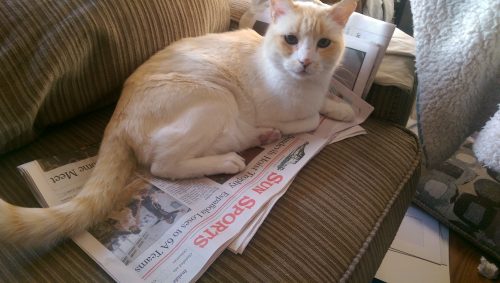
Given a whole couch to sit on, Tweaks would seek out the newsprint.
One of Tweaks’ favorite things was to sit on paper.
It was weird. I never understood why.
I guess it’s good that I work as a newspaper reporter.
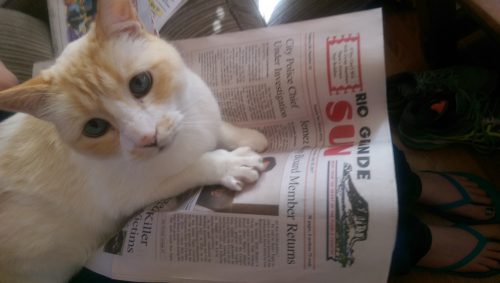
Tweaks really liked sitting on paper. Newspaper, sketching paper, glossy paper, it didn’t matter. It didn’t matter if it was on a couch, a lap, a table, the floor. He wanted to sit on paper.
Tweaks had a cat tree and usually when I’d get home in the evening, he would be on the cat tree, staring at the window. As soon as he made eye contact, he would start meowing at me. I could see his jaw moving, even if I couldn’t hear him.
He was a people kitty.
When I had one of the interns from work over, before we went out to La Madera to canvas for a story, he immediately jumped on Jacob’s lap.
Later on, when my dad came to visit, he would stay in the bedroom. I never figured out why he liked Jacob so much.
